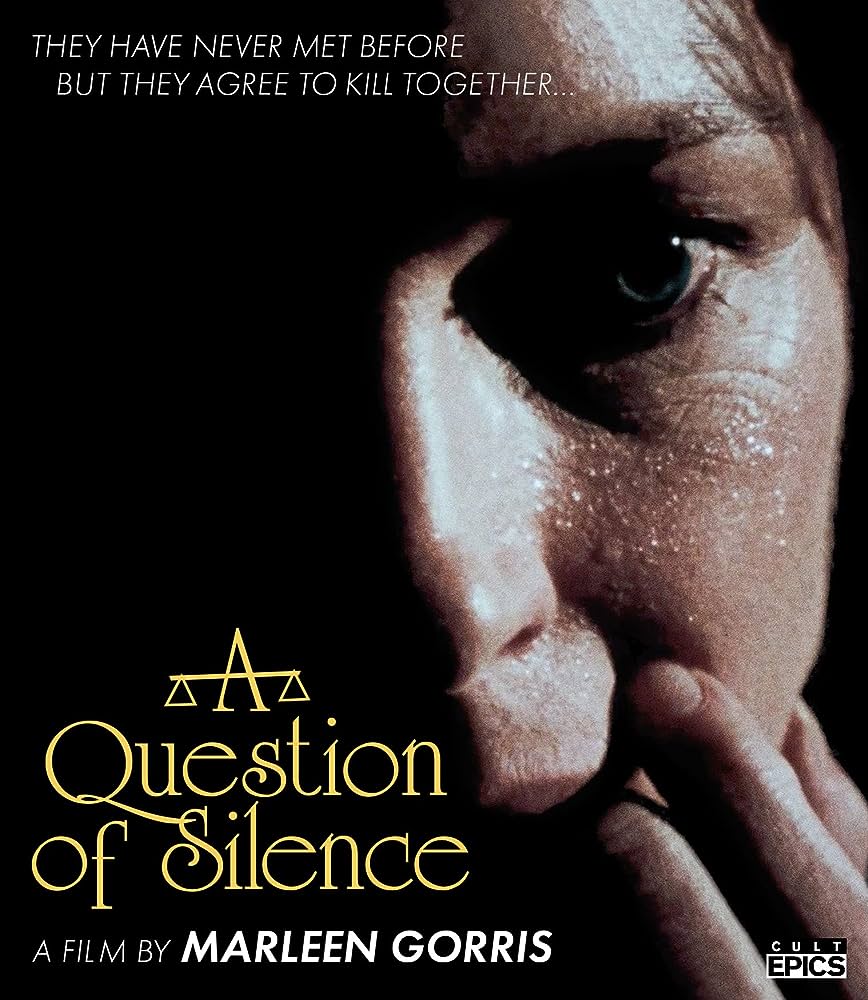New to blu comes hot-button feminist firebrand A Question of Silence from director Marleen Gorris courtesy of Cult Epics. Watch as a primal scream from a first time director becomes a latter day classic!
Three women from three different social classes (a middle income housewife [Edda Barends], a lower income diner waitress [Nelly Frijda] and a higher income secretary at a corporation [Henriëtte Tol]) have never met and do not know one another at all. Yet without any premeditation and with no verbal communication, all three participate in the savage beating and killing of the manager of a women’s boutique. Actress Cox Habbema playing a psychiatrist is brought in to diagnose them and determine what led them to such a drastic and vicious act.
A Question of Silence is a shockingly relevant film for today in the wake of the #metoo movement and the rise of feminist filmmaking in Hollywood which has culminated in the recent smash hit Barbie. While this film is a bit rough around the edges, it’s nonetheless impressive that such a powerful polemic arrived with such fanfare from a first-time director. The film’s opening showing each of the three women in their usual element going about their daily business, only to reveal that these scenes take play AFTER they have brutally killed a man, is an ingenious way to start the film. It does drag a bit in the middle as the psychiatrist interviews and attempts to analyze the women with some of the dialogue here feeling a bit opaque or forced. The psychiatrist herself is an interesting character though. A woman who has a seemingly happy marriage and could never imagine herself doing what these women do but still come to understand it is the type of character needed to sit on the fence as it were and see both sides. As such, while I didn’t find these mid-film scenes terribly engaging, I do think they are still important to the overall narrative. Some may argue that these flashbacks to the women’s lives are needed to illustrated the subtle micro-agressions and suppressions that are forced upon them on a day-to-day basis, but honestly I feel like the open scenes illustrate that point quite well even without them. The climactic gale of laughter in the courtroom is another stroke of cleverness in the film, driving the whole point of the film home without ever needing to speak a word, acting as a bookend to the wordless act that initiated the whole proceedings.
The video quality of this release is a bit of a mixed bag but may be as good as it is going to get. Looking like it was shot on 16mm, the film has quite a bit of grain present and the print the transfer was struck from contains occasional scratches and blemishes that mar the image. Despite all that, the transfer seems to have a solid color balance which is surprising given the overall soft look of the film. The sound comes courtesy of a 2.0 mono track that is perfectly fine given how dialogue-driven the film is. The disc comes with a healthy smattering of extras including two interviews, one with director Marleen Gorris and one with the actress playing the psychiatrist, Cox Habbema. Both interviews are around 8 to 10 minutes and offer a few interesting insights. Oddly enough much of the interview with Gorris doesn’t even seem to be about the film specifically but is still illuminating of her personality in general. We also have a feature length audio commentary with film scholar Patricia Pisters, and frankly I have mixed feelings on it On one hand, Pisters provides quite a bit of interesting information about the film, going into the interpretations of it and how the misogyny of the various characters affect women of different classes. On the other hand, Pisters’ voice is a bit drone-y and there’s a non-trivial amount of dead space scattered through the track. Overall, it’s still worth a listen if you are a big fan of the film, but it isn’t one I’d unreservedly recommend. Also included is a one-minute newsreel mentioning the release of the film as well as a gallery of promotional stills and some trailers.
I feel like this film is one that will continue to be re-evaluated and grow in esteem over time as a feminist film touchstone much like Chantal Akerman’s Jeanne Dielman has in recent years (for what it’s worth, I feel A Question of Silence is a more watchable film than Jeanne Dielman), being seen as a parable of female oppression rather than a call for matriarchal violence as some critics of the film have accused it.

